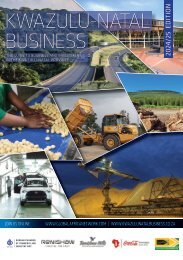Limpopo Business 2016-17 edition
The 2016/17 edition of Limpopo Business is the eighth issue of this highly successful publication that, since its launch in 2007, has established itself as the premier business and investment guide to the Limpopo province. Limpopo is unique in terms of its abundant natural and human resources, and is also one of the key drivers behind the South African economy. This edition of Limpopo Business is officially endorsed by the Office of the Premier of Limpopo.
The 2016/17 edition of Limpopo Business is the eighth issue of this highly successful publication that, since its launch in 2007, has established itself as the premier business and investment guide to the Limpopo province.
Limpopo is unique in terms of its abundant natural and human resources, and is also one of the key drivers behind the South African economy.
This edition of Limpopo Business is officially endorsed by the Office of the Premier of Limpopo.
You also want an ePaper? Increase the reach of your titles
YUMPU automatically turns print PDFs into web optimized ePapers that Google loves.
OVERVIEW<br />
strong presence in the central,<br />
eastern and southern parts of the<br />
province.<br />
North<br />
Parts of <strong>Limpopo</strong>’s most northern<br />
district are extremely dry.<br />
Surface water mainly originates<br />
in the mountainous areas and<br />
is regulated by several dams in<br />
the upper and middle reaches<br />
of the rivers. Over-exploitation<br />
of groundwater is a problem.<br />
An innovative water-catching<br />
project run by meteorology students<br />
of the University of Pretoria<br />
is providing a community in<br />
the Soutpansberg with clean<br />
drinking water.<br />
Instead of relying on tankers<br />
to bring water to their dry area,<br />
schoolchildren in the Tshiavha<br />
village collect water from giant<br />
sheets that trap the water that<br />
has gathered as fog. Threemetre-high<br />
nets set up around<br />
the school provide about 2 500<br />
litres per day.<br />
West<br />
The Mokolo Crocodile<br />
Augmentation Project is designed<br />
to supply water to Medupi,<br />
the new power station being built<br />
at Lephalale, and to the coal mining<br />
operations that will feed it. A<br />
pump station and a 45km pipeline<br />
between the site of the power<br />
station and the Mokolo Dam are<br />
being built by the Trans-Caledon<br />
Tunnel Authority.<br />
Mokolo Crocodile Consultants,<br />
a group of five consulting<br />
firms which includes Aurecon, is providing engineering services to<br />
this project.<br />
East and south<br />
When the Olifants River Water Resources Development Project is fully<br />
developed, it will be supplying water to 23 platinum mines. The De<br />
Hoop Dam is at the centre of the scheme.<br />
Water developments in the Sekhukhune district have not been<br />
restricted to the De Hoop Dam. Five water projects with 65 associated<br />
schemes had delivered other water infrastructure, including pipes to<br />
get water to Moutse from the Loskop Dam.<br />
A concerned group of water users (from mining, heavy industry and<br />
conservation circles) have formed the Olifants River Forum to monitor<br />
change in the big catchment area. The forum is funding a team of<br />
researchers from several universities and the Council for Scientific and<br />
Industrial Research (CSIR) to conduct tests on the quality of water and<br />
threats to the same in the upper reaches of the Olifants.<br />
Polokwane<br />
The Water and Sanitation Services branch of the Polokwane Municipality<br />
operates five water-purification plants and three sewage-purification<br />
plants. As part of its Regional Water Scheme programme, Polokwane provides<br />
water to the residents of the rural areas of Mothapo, Mothiba and<br />
Makotopong. A 600-kilolitre reservoir was built and new pipes were laid.<br />
The Capricorn District Municipality funds a water-testing laboratory<br />
on the campus of the University of <strong>Limpopo</strong>.<br />
Mocha Lab has been operating in Polokwane since 2008 and has<br />
the capability to provide services to the mining and engineering sector,<br />
as well as to water authorities.<br />
ONLINE RESOURCES<br />
<strong>Limpopo</strong> Department of Economic Development,<br />
Environment and Tourism: www.ledet.gov.za<br />
National Department of Water and Sanitation:<br />
www.dwa.gov.za<br />
Olifants River Forum: www.orf.co.za<br />
South African Association of Water Utilities:<br />
www.saawu.co.za<br />
Water Institute of South Africa: www.wisa.org.za<br />
Water Research Commission: www.wrc.org.za<br />
63 LIMPOPO BUSINESS <strong>2016</strong>/<strong>17</strong>


















